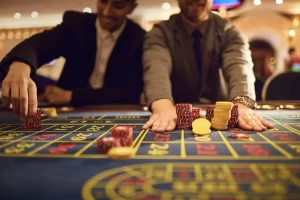The Psychology Behind Slot Machine Design

Slot machines owe their allure to psychology. From classic one-arm bandits to high definition slots, game designers employ various psychological casino techniques in order to keep players engrossed.
Understanding these techniques is integral to responsible gaming and future research should look into cognitive biases and positive reinforcement as ways of encouraging healthy gaming habits.
The Illusion of Control
Humans have an innate need to feel in control in an uncertain world, and pushing a button on a slot machine gives that sense of power to players. Additionally, seeing colors and shapes come and go gives an additional dose of dopamine which leaves people feeling good and creating the desire to keep playing longer.
This phenomenon, known as the hedonic treadmill, keeps gamblers hooked despite knowing their chances are slim of winning big. Even after realizing this fact, they continue pushing spin buttons in hopes that next time might be different and hope they might finally experience their luck!
Understanding the psychology of slot machines can help players stay safe and responsible while enjoying this form of entertainment. Setting limits on wins and losses before beginning is one way of keeping gaming strategies from taking control. Psychologists can also offer invaluable insight into player experiences, providing guidance in designing slots games which foster healthy and responsible gaming practices.
Close-to-Misses
Slot machines use flashing lights, jingling sounds and carnival-esque themes to fill your mind with thoughts of winning big. Although the odds may seem slimmer than ever, the potential payout can be immense; leading many people down an emotional rabbit hole that results in more gambling than they should.
Researchers have also discovered that near-misses in slot machines are effective ways of engaging players and keeping them hooked on playing. When the reel moves one place past its payline, creating the impression that players might win even though a random number generator determines its outcome.
Understanding player psychology is of utmost importance for game designers when designing immersive and engaging slot games. Doing so allows them to develop games that take cognition biases into account, promote responsible gaming features and ensure a safer playing experience for their customers. Incorporating psychological insights also leads to more realistic and interactive gameplay experiences for gamers overall, creating an overall better gaming experience for gamers.
Reward Systems
After winning at slot machines, flashing lights and joyous music provide an instantaneous rush of dopamine to the brain; this release causes feelings of euphoria that keep players coming back for more!
Psychologists provide insights into gaming psychology that contribute to responsible game design by providing developers with knowledge of cognitive biases that influence player behavior and can contribute to responsible slot game play. Likewise, the repetitive nature of slot games can create an unconscious flow state that causes players to lose track of time and increase gambling expenditures. Psychologists offer insights into gaming psychology that provide responsible game development by helping designers understand cognitive biases that shape player decisions and spending patterns.
While many may turn away from games of chance like slot machines, others find them irresistible due to their lack of skill requirements. Studies indicate that slot players are three to four times more likely to develop gambling disorder than those playing table games or betting on sports – yet slot gaming continues to make up 75% of casino revenue worldwide.
Stimulation
Psychologically speaking, slot machine appeal lies in their ability to provide stimuli that keep players interested. This is accomplished using intermittent reinforcement – an operant conditioning principle which reinforces behavior by only offering rewards intermittently – thus motivating subjects to repeat it more often.
Unpredictability in slots wins and losses is another feature that keeps players engaged with this form of entertainment, as machines use variable ratio reinforcement schedules which makes winning impossible to predict; players could win on any spin from 1st spin up until 1000th.
Auditory experiences of slot game slots are essential to maintaining players’ interest, as specific sounds can trigger physiological responses that raise a player’s arousal level – particularly if associated with winning and even impacting heart rate or skin conductance levels. By understanding the psychology behind slot games, developers can craft more engaging experiences that promote responsible gambling.





